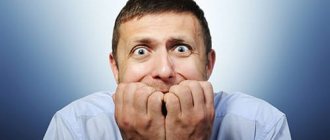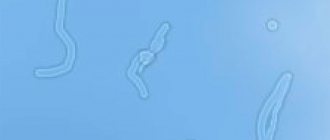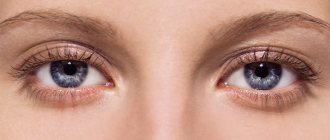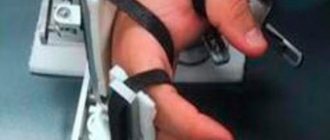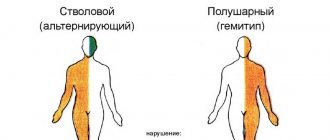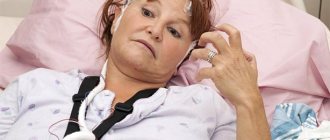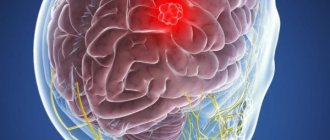If you have a headache in the morning after sleep, the painful sensations are usually pronounced, which is why they interfere with concentration and negatively affect motor activity and ability to work. The reasons why you might experience an attack of cephalalgia when you wake up in the morning vary significantly. The head in the back of the head may hurt due to an uncomfortable position during sleep or due to the dose of alcohol drunk the day before, which is associated with a toxic effect on brain cells, spasms of blood vessels and muscles of the soft tissues of the head, and an increase in blood pressure.
Classification and pathogenesis
The main causes of the condition when a person wakes up with a headache in the morning are associated with irritation of nociceptors (pain receptors). Painful sensations appear when nociceptors located in the tissues and parts of the head are irritated:
- Tendon helmet.
- Skin and subcutaneous tissue.
- The vascular system running in the soft tissues of the head.
- Periosteum of the cranial bones.
- Meninges.
- Arteries, veins and sinuses located inside the skull.
- Cranial nerves.
Irritation of nociceptors occurs as a result of compression or stretching of the above structures. Pain reception is absent in the parts of the choroid plexus of the ventricular system, the medulla, the bones of the skull, and the ependyma. The main reasons why headaches appear in the morning after sleep are associated with physiological processes. The mechanisms of development of cephalalgia can vary significantly. There are types:
- Vascular. This type correlates with different types of cerebral arteriovenous dystonia. Painful sensations can develop as a result of a decrease in the tone of the walls of the cerebral arteries. As a result, they are overstretched under the influence of the pulse volume of blood. Other options for the development of cephalgia are as a result of spasm of the cerebral arteries or excessive filling of venous vessels (veins, sinuses) with blood due to impaired venous outflow.
- Muscle tension. Cephalgia develops as a result of tension or compression of the muscles located in the soft tissues of the head. Usually correlates with neuroses or stress, which lead to increased transmission of nerve impulses at neuromuscular synapses. Other options for the development of cephalgia are humoral hormonal disorders that occur, for example, with thyrotoxicosis. Muscle tension in the area of the soft integument of the skull can occur as a reaction to a pathological process (diseases of the organs of vision and hearing, paranasal sinuses, osteochondrosis in the cervical region), accompanied by painful impulses.
- Liquorodynamic. Any disturbances in the production and drainage of cerebrospinal fluid are associated with the development of intracranial hypertension or hypotension, which in turn causes pain in the head area. Impaired cerebrospinal fluid dynamics with an increase in intracranial pressure correlates with volumetric intracranial pathological processes - tumors, cysts, foci of hemorrhage, abscess.
- Neuralgic. Cephalgia is associated with the formation of a pathological focus of increased activity in the nociceptive structures of the trigeminal nerve. Another development option is compression of the sensory nerve according to the principle of tunnel syndrome.
- Psychalgia. Pain of a psychogenic nature, which often occurs with neuroses, depression and accompanies panic attacks. Cephalgia is not associated with physiological processes and occurs as a result of increased mental activity.
The vascular type of cephalgia is detected with migraine, arterial hypertension, and cerebral vegetative-vascular dystonia. More often, the mechanism for the development of headaches is mixed - cephalgia occurs due to the influence of several factors. A combination of several mechanisms for the formation of pain in the head occurs during stroke, infectious lesions of the central nervous system (meningitis, encephalitis), and head injury. If you have a headache every morning, it is important to understand the reasons for what is happening.
Why does long sleep bring headaches?
After a hard week at work, everyone makes the same mistake - they sleep too much. But in the morning, when I wake up, my head begins to hurt unbearably. It hums, throbs, aches, which characterizes a weekend migraine. Discomfort occurs because a person disrupts the usual circadian rhythm, where 8-9 hours of night time are allocated for sleep. Patients complain that they sleep a lot, but fatigue persists.
Another reason is increased accumulation of serotonin. The hormone of “happiness” gives pleasure, but when it is hyperconcentrated, a migraine-like condition appears.
Causes
If you have a headache in the morning when you wake up, you need to establish why this is happening in order to eliminate the cause that causes cephalalgia. Often such sensations are provoked by a stressful situation or physical overexertion.
Uncontrolled use of painkillers is associated with the development of abusive pain in the head area.
The cause of morning headaches in women is associated with hormonal changes during ovulation, gestation or menopause. During pregnancy, painful sensations in the head are often accompanied by nausea and vomiting. If a headache and nausea appear at the same time, the symptoms may indicate the formation of a tumor in the brain tissue. In cases where you regularly have headaches and nausea at night or in the morning, you need to get medical advice to rule out serious illnesses.
Similar symptoms are observed with some infections of the central nervous system (meningitis, encephalitis), so you should urgently seek medical help in cases where additional signs appear - increased body temperature, convulsions, numbness of the face, limbs, muscle stiffness in the back of the head. If you wake up with a feeling of pain in your head, you should analyze the situation to clarify what factors could cause cephalalgia.
Lack of sleep
To function normally, the body requires 7-8 hours of proper rest. Moreover, not only the duration of rest, but also sleep hygiene is of great importance, because the cause of pain may be due to lack of access to fresh air, high ambient temperature or an uncomfortable pillow. Sleep deficiency leads to hormonal imbalance, an increase in the number of heart beats per minute, and an increase in blood pressure.
To prevent this type of headache, you need to improve your sleep schedule. You can get rid of painful sensations with the help of non-steroidal anti-inflammatory drugs (Aspirin, Ibuprofen). A short nap of 30 minutes, as an emergency measure, will help quickly restore normal well-being.
Excessive sleep
The cause of a condition where a headache in the morning after sleep often correlates with an excessively long stay in bed. Sleeping longer than 9 hours reduces the production of the neurotransmitter serotonin, which is dependent on glucose intake and exposure to sunlight.
A decrease in the concentration of the neurotransmitter serotonin leads to an increase in the sensitivity of the pain system. As a result, the body's reaction to irritating external and internal stimuli increases. Often this type of cephalalgia occurs on weekends, when people want to get some sleep after a busy week of work.
Decreased concentration of endorphins
If you have a headache after waking up, perhaps the reason lies in a decrease in the concentration of endorphins - polypeptide compounds whose effect is similar to the effect of opiates. Endorphins are produced in the brain and reduce sensitivity to painful stimuli. They reduce pain and improve mood.
Endorphin production increases in response to short-term stress or physical activity. During sleep, the concentration of endorphins in the blood decreases, which can provoke cephalalgia when a person wakes up. An effective means of therapy in such a situation will be active morning exercises, which stimulate the production of endorphins.
Effect of caffeine
A headache in the morning after sleep may appear if the person drank a large amount of coffee or strong tea the night before. Caffeine, which is contained in drinks, stimulates the activity of the nervous system. Once in the blood, caffeine provokes the production of adrenaline and norepinephrine, which leads to the expansion of the vascular lumen.
Lack of caffeine also contributes to pain in the head area. If a person drinks a cup of coffee every morning and then takes a break for some reason, cephalalgia may occur. Avoiding excessive amounts of coffee will help relieve headaches. However, you need to give up the drink gradually, reducing the daily volume daily for 2 weeks.
Drinking alcoholic beverages
If you have a headache when you wake up, the reason may be related to recent drinking. Even in small quantities, ethyl alcohol causes dehydration and insomnia. Lack of rest and moisture in the body are factors that provoke the appearance of painful sensations in the skull area. To correct the situation, dehydration therapy is carried out. For this purpose, drink ordinary clean and mineral water, take electrolyte solutions.
Respiratory dysfunction
Morning headaches can occur due to apnea (short-term cessation of breathing movements). The average pause in breathing is about 30 seconds. The frequency of apnea episodes can reach 15 within 1 hour, which leads to a deterioration in the supply of oxygen to brain tissue.
Apnea provokes an increase in intracranial pressure, which leads to pain in the head area. Sleep apnea causes a condition where the back of the head hurts in the morning, and the ability to concentrate and performance deteriorates.
Arterial hypertension
The headache hurts every day in the morning, and then goes away if the patient’s history includes a diagnosis of arterial hypertension, which is characterized by a persistent increase in blood pressure, which is why morning cephalgia occurs. Headaches can be controlled with antihypertensive medications.
Depression
Headache after sleep in the morning or afternoon due to depression, which is often associated with a decrease in serotonin concentration, which is why cephalalgia occurs. This type of headache occurs at any time of the day, but is more common in the morning. With depression, sleep disturbances are usually observed, which aggravates the course of cephalalgia. Psychotherapy and medications with a calming and sedative effect will help eliminate the disorders.
If you are unable to independently determine what causes your headache in the morning, it is better to consult a specialist. The doctor will prescribe a diagnostic examination to find out the mechanisms of development of cephalalgia and choose an appropriate treatment program.
Increasing physical activity
A sedentary lifestyle has a very bad effect on the quality of sleep, but when planning to increase physical activity, you need to keep in mind some of the characteristics of our body.
If you spend an hour or two in the evening doing fitness in the gym, you may not fall asleep after that. Intense exercise will not only raise your body temperature, but it will also affect the activity levels of a number of hormones, and this can delay falling asleep and affect the quality of your sleep.
If you go to the gym in the evening, schedule your workouts so that they end 3-4 hours before bedtime.
If you're not into sports or fitness, start small. Even just 20 minutes of exercise upon returning from work can improve the situation.
And, of course, nothing beats an evening walk, because it’s movement, fresh air, and an opportunity to escape from various worries.
Diagnostics
A diagnostic examination will help to find out the reason why headaches occur at night and in the morning. There are no specific examination techniques to identify the type of cephalalgia. When making a diagnosis, the doctor relies on medical history and information provided by the patient, who describes the nature, intensity of pain, and accompanying symptoms.
Adjusting the light
Much has been written about how blue light waves reduce the production of melatonin, and therefore sleep specialists advise not to sit in front of screens or use gadgets for at least an hour before going to bed.
In case you do find yourself sitting in front of a computer late into the night, it is useful to keep in mind that there are special glasses that block blue light, as well as computer applications with a similar function.
Not everyone knows that to get a good night's sleep, we need bright light during the day, which also affects circadian rhythms and, ultimately, how rested you feel in the morning.
Walking during the day, even in cloudy weather, will help you rest better at night.
In addition - and this is especially important in the cold and dark seasons - the lighting in the workroom should be bright enough. It will keep you alert and focused throughout the day and help your body keep its biological clock in good working order.
Treatment
Treatment of cephalgia is carried out taking into account the reasons that provoked it. In vascular forms, when disorders are associated with a weakening of the tone of the vascular wall, drugs are prescribed - Ergotamine, Sumatriptan. For vegetative-vascular dystonia, treatment is carried out with drugs - Eufillin, Xanthinol nicotinate. If cephalgia is associated with spasm of the vascular wall, taking drugs with an antispasmodic effect (Papaverine, No-Shpa) is indicated. The doctor may prescribe medications from the following groups:
- Agonists (strengthen the biological response) of adenylate cyclase - preparations based on the plant Vinca minor.
- Alpha-adrenergic receptor blockers (Pirroxan, Nicergoline).
- Antagonists (neutralize the effect) of calcium ions (Nifedipine, Nimodipine).
For the vascular form of cephalgia associated with impaired venous outflow, drugs of the xanthine group are most effective. For cephalgia, which correlates with muscle tension, tranquilizers and antidepressants are prescribed. If painful sensations develop against the background of diseases of the organs of hearing and vision, degenerative-dystrophic pathologies of the spine, therapy for the primary disease is carried out.
For cephalgia associated with increased intracranial pressure, treatment is carried out with diuretics. Neuralgia is treated with antiepileptic drugs (Carbamazepine). In parallel, the doctor may prescribe a lidocaine blockade and physiotherapeutic procedures. Neuroleptics and tranquilizers are used to treat psychalgia.
Prevention
To prevent attacks of cephalalgia, it is important to establish your daily routine, setting aside enough time for rest and sleep. To relax before going to bed, you can take a warm bath with a few drops of aromatic oils that give a relaxing effect. You should ensure access to fresh air in the bedroom by ventilating the room before going to bed.
Comfortable bedding (pillow, mattress) contributes to a relaxing rest. It's better to go to bed and get up at about the same time. Doctors recommend leading an active, mobile lifestyle, organizing a nutritious diet rich in vitamins and microelements. Timely treatment of somatic diseases and mental disorders is an effective preventive measure.
Headache that occurs in the morning can be associated with various pathological processes. Your doctor will tell you what to do if you have a headache in the morning after sleep, after first finding out the causes of cephalalgia. Careful diagnosis and correct therapy will help get rid of painful sensations.
conclusions
Arterial hypotension can occur at any age. Moderate low blood pressure is not a dangerous pathology, but it can significantly worsen the patient’s condition, limit the ability to work, and cause unpleasant symptoms: weakness, trembling in the arms and legs, dizziness and drowsiness after sleep, up to loss of consciousness with a strong decrease in blood pressure. Considering the variety of factors that can cause hypotension, when the first signs of the disease appear, you should consult a physician, cardiologist or neurologist. After the examination, the doctor will prescribe therapy and adjust the work and rest schedule.
